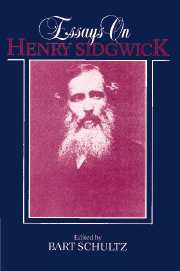Book contents
- Frontmatter
- Contents
- Foreword
- Acknowledgments
- List of contributors
- List of abbreviations
- Introduction: Henry Sidgwick today
- PART I Common-sense morality, deontology, utilitarianism
- PART II Egoism, dualism, identity
- PART III Hedonism, good, perfection
- PART IV History, politics, pragmatism
- 12 The ordinary experience of civilized life: Sidgwick's politics and the method of reflective analysis
- 13 Rethinking tradition: Sidgwick and the philosophy of the via media
- Index
13 - Rethinking tradition: Sidgwick and the philosophy of the via media
Published online by Cambridge University Press: 05 June 2012
- Frontmatter
- Contents
- Foreword
- Acknowledgments
- List of contributors
- List of abbreviations
- Introduction: Henry Sidgwick today
- PART I Common-sense morality, deontology, utilitarianism
- PART II Egoism, dualism, identity
- PART III Hedonism, good, perfection
- PART IV History, politics, pragmatism
- 12 The ordinary experience of civilized life: Sidgwick's politics and the method of reflective analysis
- 13 Rethinking tradition: Sidgwick and the philosophy of the via media
- Index
Summary
Although Henry Sidgwick is doubtless best known for his role in the reformulation of utilitarianism, he also played an important part in a broader transatlantic community of discourse. Having written elsewhere about Sidgwick's ideas in the context of that more general transformation of American and European philosophy and political theory, I will concentrate in this essay on the relation between Sidgwick's ideas and those of the American pragmatists William James and John Dewey. Both James and Dewey admired Sidgwick, and James knew him well not only as a philosopher but as a fellow member of the Society for Psychical Research. After Sidgwick's death in 1900, James wrote a moving tribute to Sidgwick's widow describing the “flawlessness in quality” of his character as well as his genius as a philosopher. In Dewey's estimation, Sidgwick stood as a “monument” to all that was best in the British liberal tradition because of his “simplicity, openmindedness, absolute fairness and sincerity.” But it was not merely Sidgwick's personality that attracted James and Dewey. They were drawn equally to Sidgwick's incisive criticism of prevailing options available in late nineteenthcentury thought: idealism and positivism in epistemology, Kantian intuitionism and Benthamite utilitarianism in ethics, and revolutionary socialism and laissez-faire liberalism in political theory. Like James and Dewey, Sidgwick worked to create alternatives to such positions not only because he was by nature a moderate – although he surely was that – but because he genuinely believed that more fruitful philosophical and political arguments lay between, or beyond, those poles.
- Type
- Chapter
- Information
- Essays on Henry Sidgwick , pp. 369 - 396Publisher: Cambridge University PressPrint publication year: 1992
- 2
- Cited by



